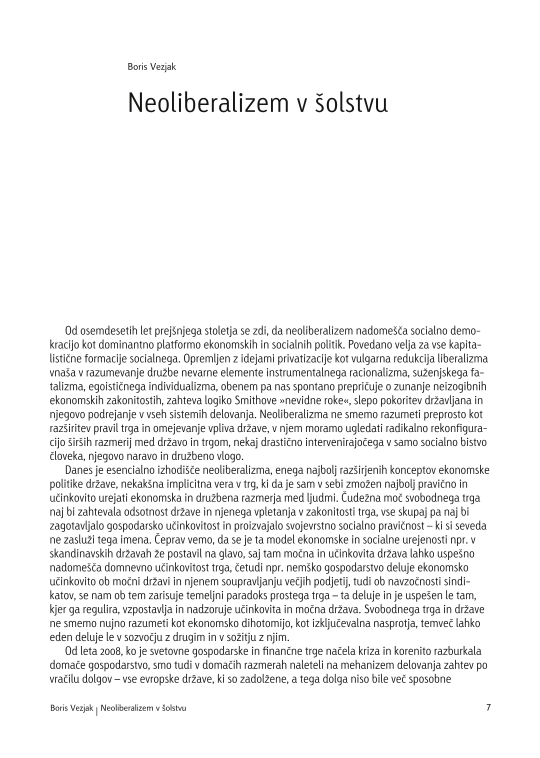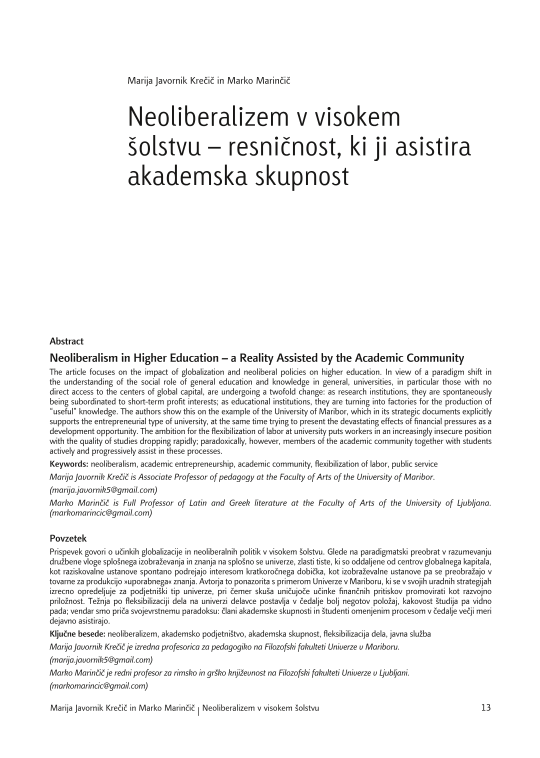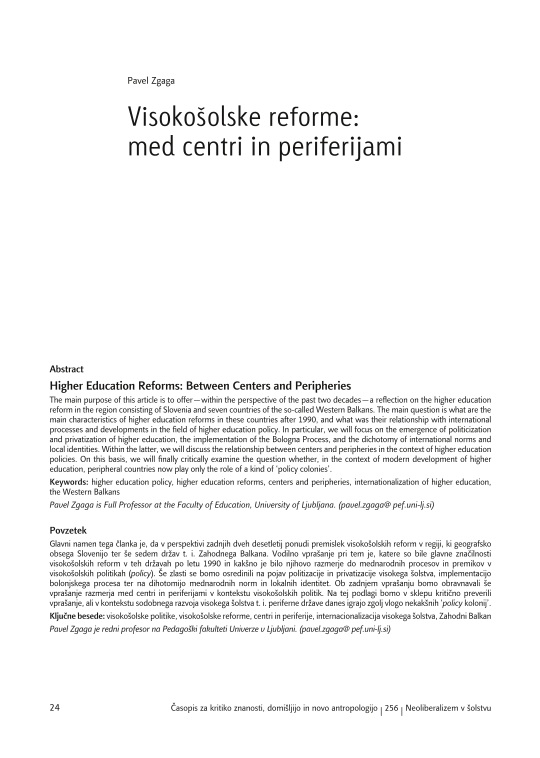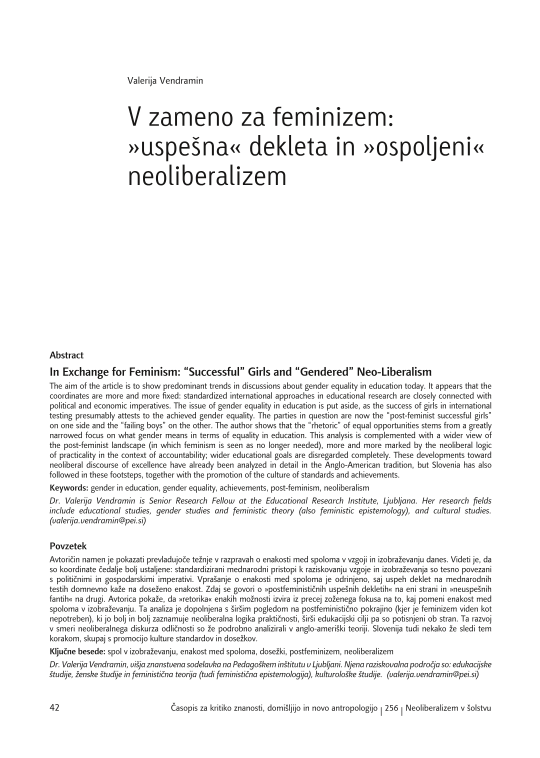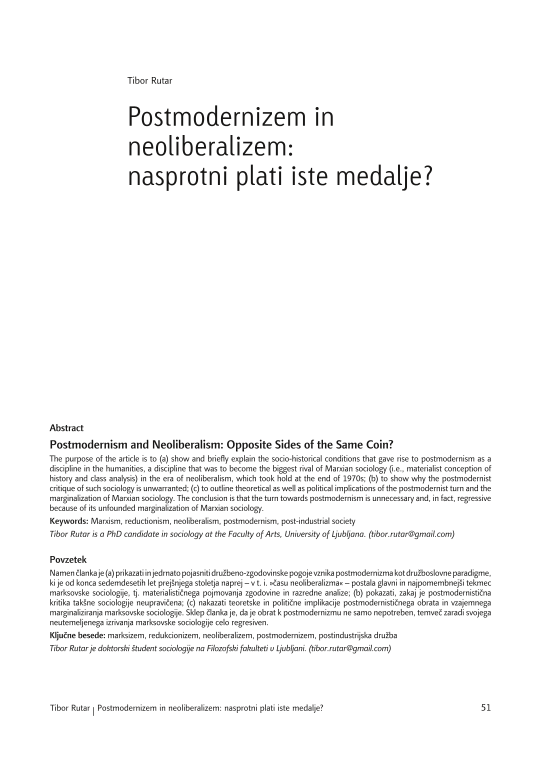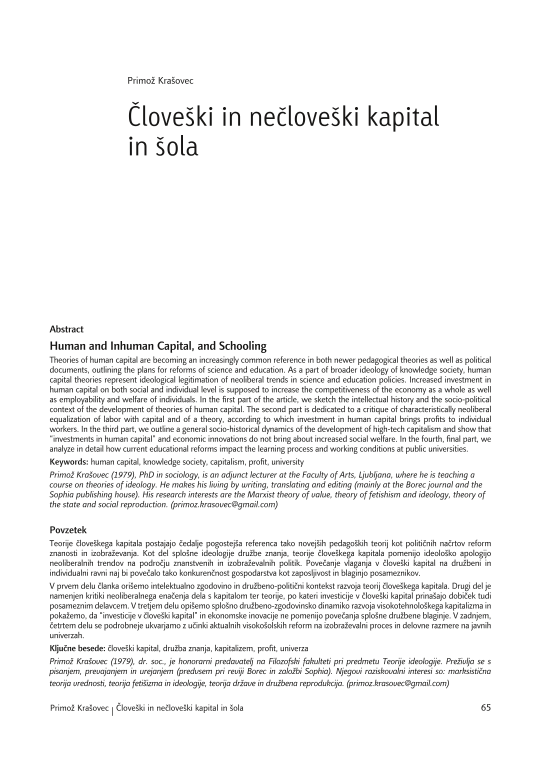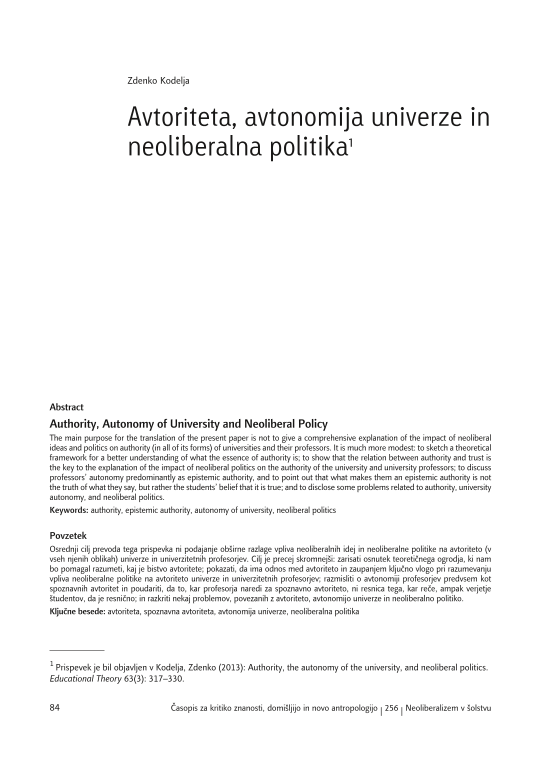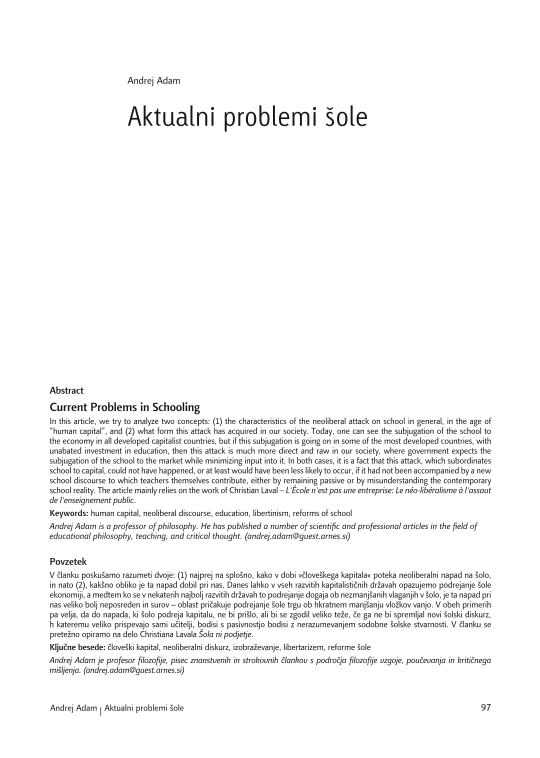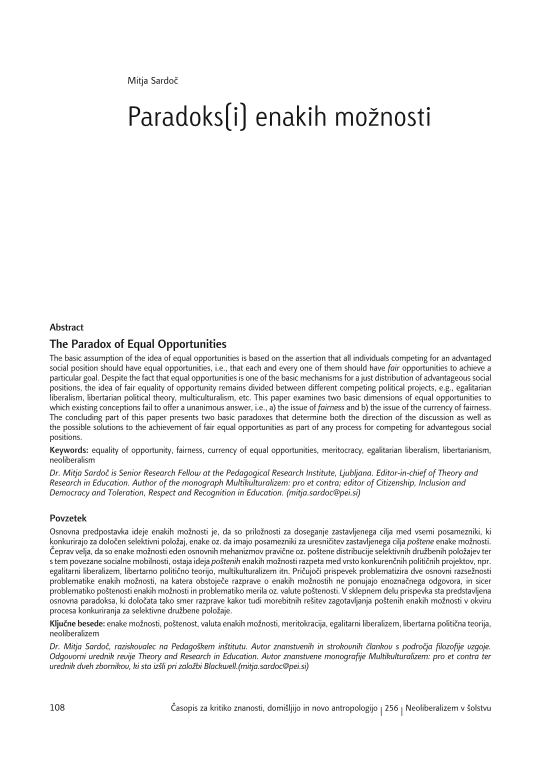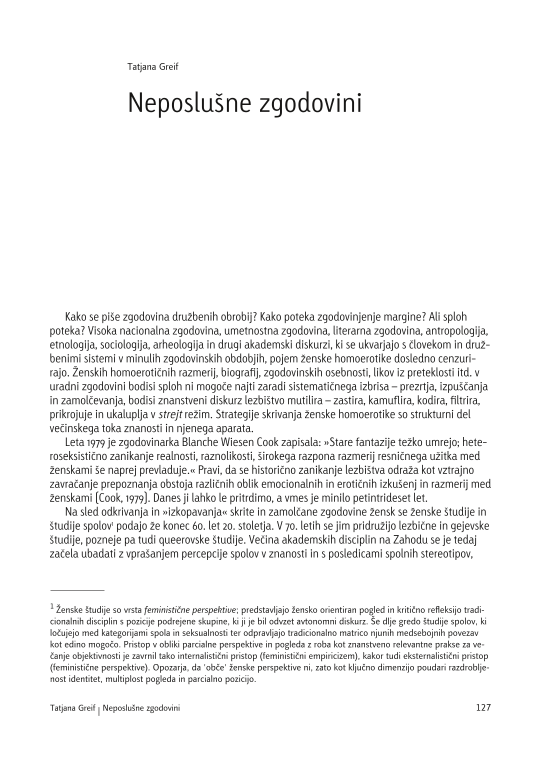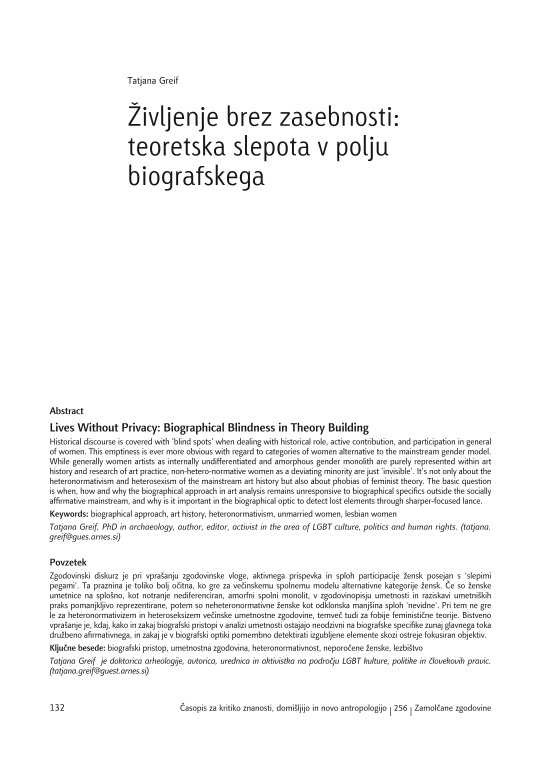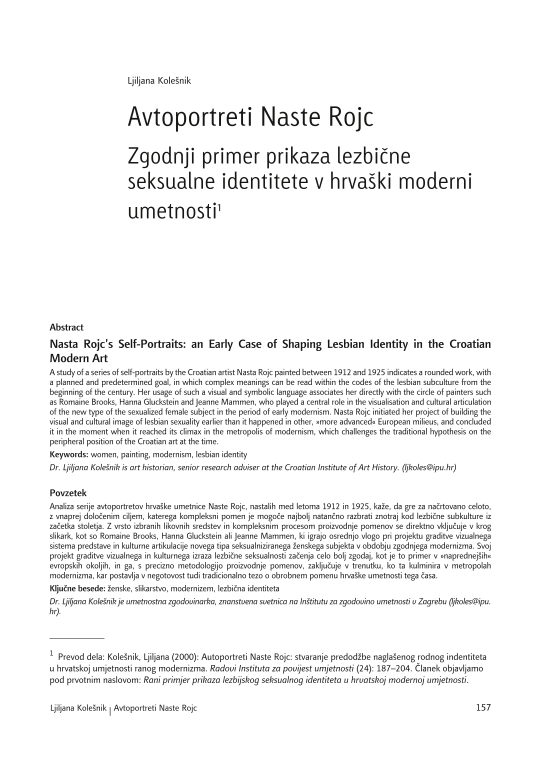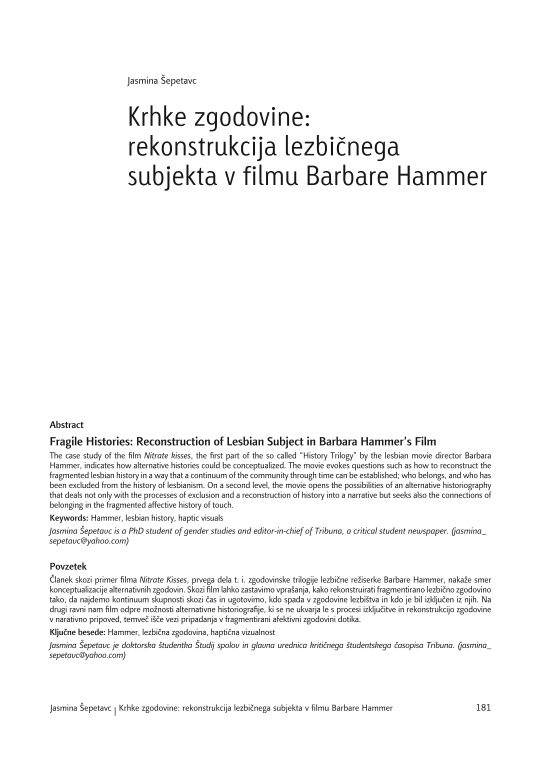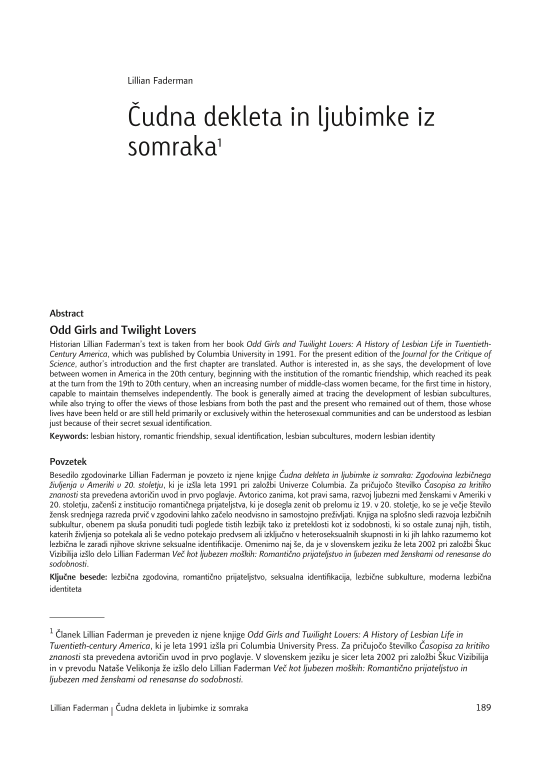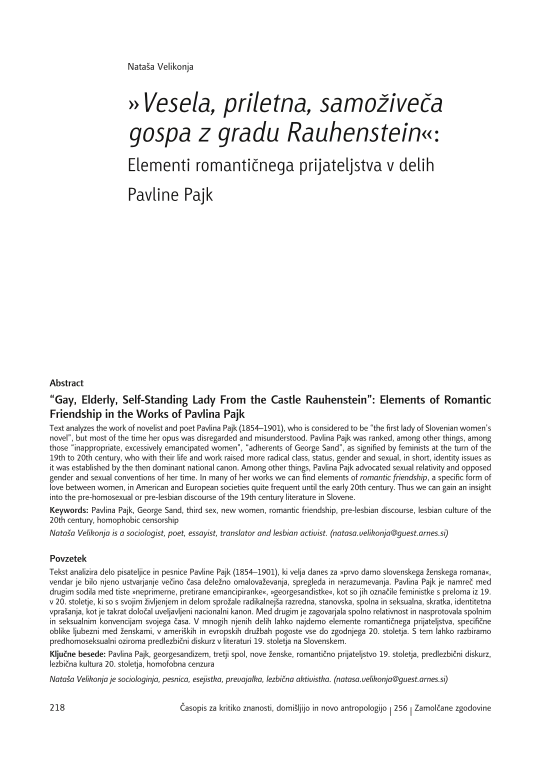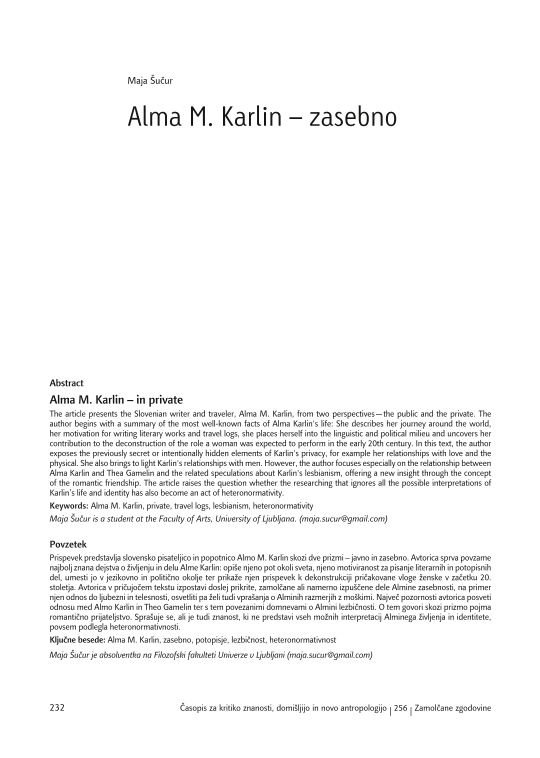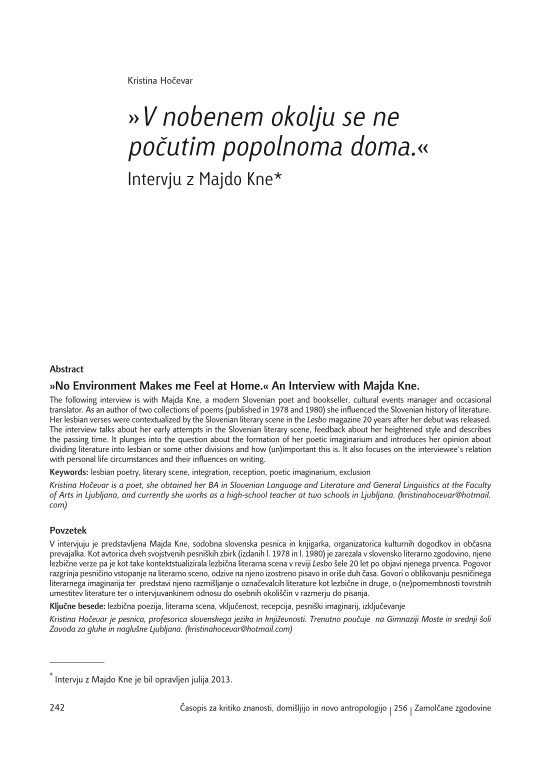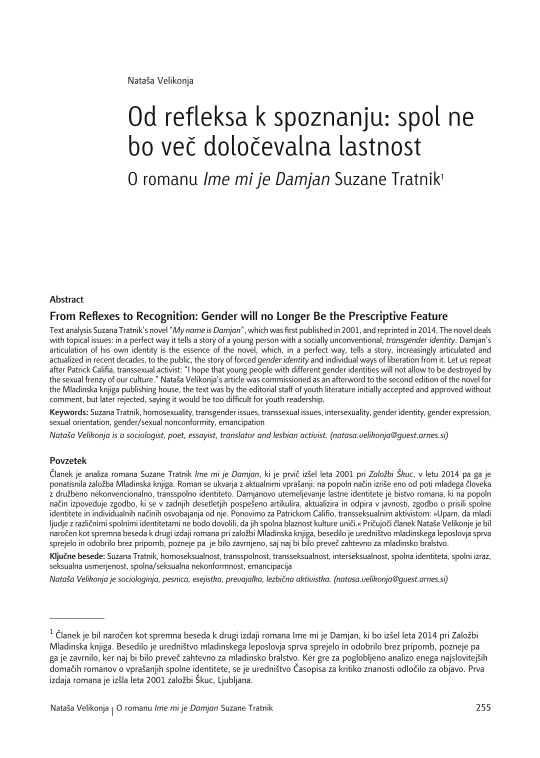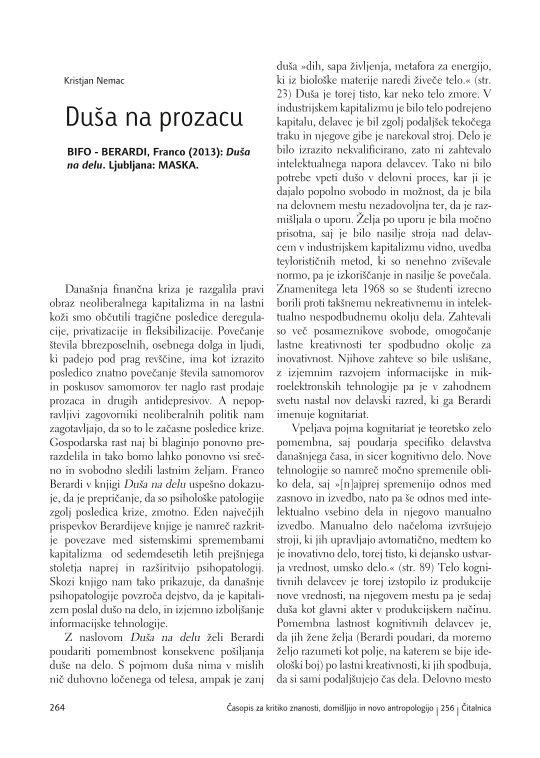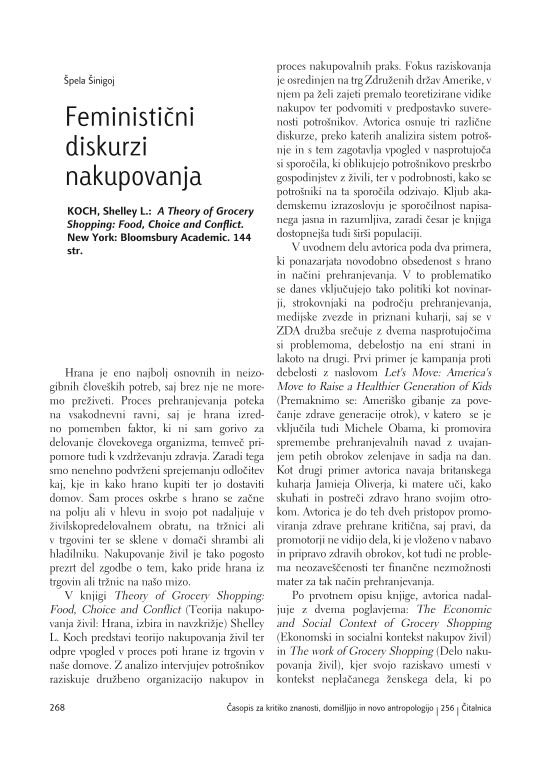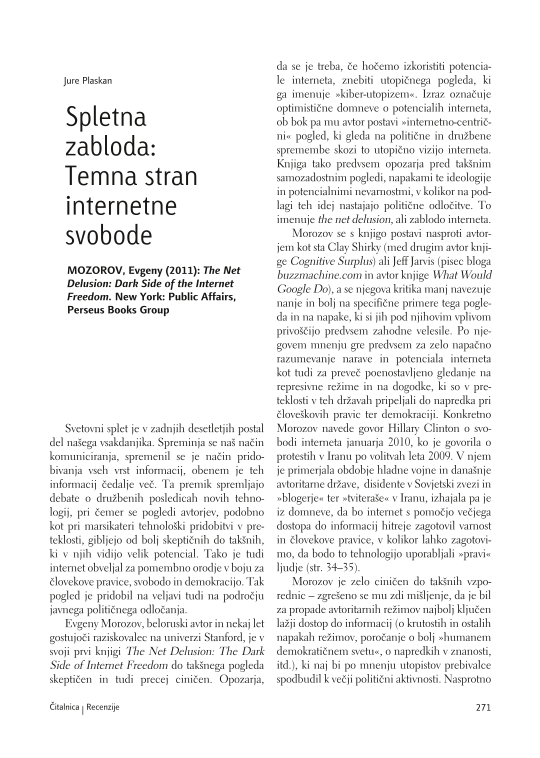Od osemdesetih let prejšnjega stoletja se zdi, da neoliberalizem nadomešča socialno demokracijo kot dominantno platformo ekonomskih in socialnih politik. Povedano velja za vse kapitalistične formacije socialnega. Opremljen z idejami privatizacije kot vulgarna redukcija liberalizma vnaša v razumevanje družbe nevarne elemente instrumentalnega racionalizma, suženjskega fatalizma, egoističnega individualizma, obenem pa nas spontano prepričuje o zunanje neizogibnih ekonomskih zakonitostih, zahteva logiko Smithove »nevidne roke«, slepo pokoritev državljana in njegovo podrejanje v vseh sistemih delovanja. Neoliberalizma ne smemo razumeti preprosto kot razširitev pravil trga in omejevanje vpliva države, v njem moramo ugledati radikalno rekonfiguracijo širših razmerij med državo in trgom, nekaj drastično intervenirajočega v samo socialno bistvo človeka, njegovo naravo in družbeno vlogo.
Danes je esencialno izhodišče neoliberalizma, enega najbolj razširjenih konceptov ekonomske politike države, nekakšna implicitna vera v trg, ki da je sam v sebi zmožen najbolj pravično in učinkovito urejati ekonomska in družbena razmerja med ljudmi. Čudežna moč svobodnega trga naj bi zahtevala odsotnost države in njenega vpletanja v zakonitosti trga, vse skupaj pa naj bi zagotavljalo gospodarsko učinkovitost in proizvajalo svojevrstno socialno pravičnost – ki si seveda ne zasluži tega imena. Čeprav vemo, da se je ta model ekonomske in socialne urejenosti npr. v skandinavskih državah že postavil na glavo, saj tam močna in učinkovita država lahko uspešno nadomešča domnevno učinkovitost trga, četudi npr. nemško gospodarstvo deluje ekonomsko učinkovito ob močni državi in njenem soupravljanju večjih podjetij, tudi ob navzočnosti sindikatov, se nam ob tem zarisuje temeljni paradoks prostega trga – ta deluje in je uspešen le tam, kjer ga regulira, vzpostavlja in nadzoruje učinkovita in močna država. Svobodnega trga in države ne smemo nujno razumeti kot ekonomsko dihotomijo, kot izključevalna nasprotja, temveč lahko eden deluje le v sozvočju z drugim in v sožitju z njim.
The article focuses on the impact of globalization and neoliberal policies on higher education. In view of a paradigm shift in the understanding of the social role of general education and knowledge in general, universities, in particular those with no direct access to the centers of global capital, are undergoing a twofold change: as research institutions, they are spontaneously being subordinated to short-term profit interests; as educational institutions, they are turning into factories for the production of “useful” knowledge. The authors show this on the example of the University of Maribor, which in its strategic documents explicitly supports the entrepreneurial type of university, at the same time trying to present the devastating effects of financial pressures as a development opportunity. The ambition for the flexibilization of labor at university puts workers in an increasingly insecure position with the quality of studies dropping rapidly; paradoxically, however, members of the academic community together with students actively and progressively assist in these processes.
The main purpose of this article is to offer—within the perspective of the past two decades—a reflection on the higher education reform in the region consisting of Slovenia and seven countries of the so-called Western Balkans. The main question is what are the main characteristics of higher education reforms in these countries after 1990, and what was their relationship with international processes and developments in the field of higher education policy. In particular, we will focus on the emergence of politicization and privatization of higher education, the implementation of the Bologna Process, and the dichotomy of international norms and local identities. Within the latter, we will discuss the relationship between centers and peripheries in the context of higher education policies. On this basis, we will finally critically examine the question whether, in the context of modern development of higher education, peripheral countries now play only the role of a kind of ‘policy colonies’.
The aim of the article is to show predominant trends in discussions about gender equality in education today. It appears that the coordinates are more and more fixed: standardized international approaches in educational research are closely connected with political and economic imperatives. The issue of gender equality in education is put aside, as the success of girls in international testing presumably attests to the achieved gender equality. The parties in question are now the “post-feminist successful girls” on one side and the “failing boys” on the other. The author shows that the “rhetoric” of equal opportunities stems from a greatly narrowed focus on what gender means in terms of equality in education. This analysis is complemented with a wider view of the post-feminist landscape (in which feminism is seen as no longer needed), more and more marked by the neoliberal logic of practicality in the context of accountability; wider educational goals are disregarded completely. These developments toward neoliberal discourse of excellence have already been analyzed in detail in the Anglo-American tradition, but Slovenia has also followed in these footsteps, together with the promotion of the culture of standards and achievements.
The purpose of the article is to (a) show and briefly explain the socio-historical conditions that gave rise to postmodernism as a discipline in the humanities, a discipline that was to become the biggest rival of Marxian sociology (i.e., materialist conception of history and class analysis) in the era of neoliberalism, which took hold at the end of 1970s; (b) to show why the postmodernist critique of such sociology is unwarranted; (c) to outline theoretical as well as political implications of the postmodernist turn and the marginalization of Marxian sociology. The conclusion is that the turn towards postmodernism is unnecessary and, in fact, regressive because of its unfounded marginalization of Marxian sociology.
Theories of human capital are becoming an increasingly common reference in both newer pedagogical theories as well as political documents, outlining the plans for reforms of science and education. As a part of broader ideology of knowledge society, human capital theories represent ideological legitimation of neoliberal trends in science and education policies. Increased investment in human capital on both social and individual level is supposed to increase the competitiveness of the economy as a whole as well as employability and welfare of individuals. In the first part of the article, we sketch the intellectual history and the socio-political context of the development of theories of human capital. The second part is dedicated to a critique of characteristically neoliberal equalization of labor with capital and of a theory, according to which investment in human capital brings profits to individual workers. In the third part, we outline a general socio-historical dynamics of the development of high-tech capitalism and show that “investments in human capital” and economic innovations do not bring about increased social welfare. In the fourth, final part, we analyze in detail how current educational reforms impact the learning process and working conditions at public universities.
The main purpose for the translation of the present paper is not to give a comprehensive explanation of the impact of neoliberal ideas and politics on authority (in all of its forms) of universities and their professors. It is much more modest: to sketch a theoretical framework for a better understanding of what the essence of authority is; to show that the relation between authority and trust is the key to the explanation of the impact of neoliberal politics on the authority of the university and university professors; to discuss professors’ autonomy predominantly as epistemic authority, and to point out that what makes them an epistemic authority is not the truth of what they say, but rather the students’ belief that it is true; and to disclose some problems related to authority, university autonomy, and neoliberal politics.
In this article, we try to analyze two concepts: (1) the characteristics of the neoliberal attack on school in general, in the age of “human capital”, and (2) what form this attack has acquired in our society. Today, one can see the subjugation of the school to the economy in all developed capitalist countries, but if this subjugation is going on in some of the most developed countries, with unabated investment in education, then this attack is much more direct and raw in our society, where government expects the subjugation of the school to the market while minimizing input into it. In both cases, it is a fact that this attack, which subordinates school to capital, could not have happened, or at least would have been less likely to occur, if it had not been accompanied by a new school discourse to which teachers themselves contribute, either by remaining passive or by misunderstanding the contemporary school reality. The article mainly relies on the work of Christian Laval – L'École n'est pas une entreprise: Le néo-libéralisme à l'assaut de l'enseignement public.
The basic assumption of the idea of equal opportunities is based on the assertion that all individuals competing for an advantaged social position should have equal opportunities, i.e., that each and every one of them should have fair opportunities to achieve a particular goal. Despite the fact that equal opportunities is one of the basic mechanisms for a just distribution of advantageous social positions, the idea of fair equality of opportunity remains divided between different competing political projects, e.g., egalitarian liberalism, libertarian political theory, multiculturalism, etc. This paper examines two basic dimensions of equal opportunities to which existing conceptions fail to offer a unanimous answer, i.e., a) the issue of fairness and b) the issue of the currency of fairness. The concluding part of this paper presents two basic paradoxes that determine both the direction of the discussion as well as the possible solutions to the achievement of fair equal opportunities as part of any process for competing for advantegous social positions.
Kako se piše zgodovina družbenih obrobij? Kako poteka zgodovinjenje margine? Ali sploh poteka? Visoka nacionalna zgodovina, umetnostna zgodovina, literarna zgodovina, antropologija, etnologija, sociologija, arheologija in drugi akademski diskurzi, ki se ukvarjajo s človekom in družbenimi sistemi v minulih zgodovinskih obdobjih, pojem ženske homoerotike dosledno cenzurirajo. Ženskih homoerotičnih razmerij, biografij, zgodovinskih osebnosti, likov iz preteklosti itd. v uradni zgodovini bodisi sploh ni mogoče najti zaradi sistematičnega izbrisa – prezrtja, izpuščanja in zamolčevanja, bodisi znanstveni diskurz lezbištvo mutilira – zastira, kamuflira, kodira, filtrira, prikrojuje in ukaluplja v strejt režim. Strategije skrivanja ženske homoerotike so strukturni del večinskega toka znanosti in njenega aparata.
Leta 1979 je zgodovinarka Blanche Wiesen Cook zapisala: »Stare fantazije težko umrejo; heteroseksistično zanikanje realnosti, raznolikosti, širokega razpona razmerij resničnega užitka med ženskami še naprej prevladuje.« Pravi, da se historično zanikanje lezbištva odraža kot vztrajno zavračanje prepoznanja obstoja različnih oblik emocionalnih in erotičnih izkušenj in razmerij med ženskami (Cook, 1979). Danes ji lahko le pritrdimo, a vmes je minilo petintrideset let.
Historical discourse is covered with ‘blind spots’ when dealing with historical role, active contribution, and participation in general of women. This emptiness is ever more obvious with regard to categories of women alternative to the mainstream gender model. While generally women artists as internally undifferentiated and amorphous gender monolith are purely represented within art history and research of art practice, non-hetero-normative women as a deviating minority are just ‘invisible’. It’s not only about the heteronormativism and heterosexism of the mainstream art history but also about phobias of feminist theory. The basic question is when, how and why the biographical approach in art analysis remains unresponsive to biographical specifics outside the socially affirmative mainstream, and why is it important in the biographical optic to detect lost elements through sharper-focused lance.
Nasta Rojc’s Self-Portraits: an Early Case of Shaping Lesbian Identity in the Croatian Modern Art
(
A study of a series of self-portraits by the Croatian artist Nasta Rojc painted between 1912 and 1925 indicates a rounded work, with a planned and predetermined goal, in which complex meanings can be read within the codes of the lesbian subculture from the beginning of the century. Her usage of such a visual and symbolic language associates her directly with the circle of painters such as Romaine Brooks, Hanna Gluckstein and Jeanne Mammen, who played a central role in the visualisation and cultural articulation of the new type of the sexualized female subject in the period of early modernism. Nasta Rojc initiated her project of building the visual and cultural image of lesbian sexuality earlier than it happened in other, »more advanced« European milieus, and concluded it in the moment when it reached its climax in the metropolis of modernism, which challenges the traditional hypothesis on the peripheral position of the Croatian art at the time.
The case study of the film Nitrate kisses, the first part of the so called “History Trilogy” by the lesbian movie director Barbara Hammer, indicates how alternative histories could be conceptualized. The movie evokes questions such as how to reconstruct the fragmented lesbian history in a way that a continuum of the community through time can be established; who belongs, and who has been excluded from the history of lesbianism. On a second level, the movie opens the possibilities of an alternative historiography that deals not only with the processes of exclusion and a reconstruction of history into a narrative but seeks also the connections of belonging in the fragmented affective history of touch.
Historian Lillian Faderman’s text is taken from her book Odd Girls and Twilight Lovers: A History of Lesbian Life in Twentieth-Century America, which was published by Columbia University in 1991. For the present edition of the Journal for the Critique of Science, author’s introduction and the first chapter are translated. Author is interested in, as she says, the development of love between women in America in the 20th century, beginning with the institution of the romantic friendship, which reached its peak at the turn from the 19th to 20th century, when an increasing number of middle-class women became, for the first time in history, capable to maintain themselves independently. The book is generally aimed at tracing the development of lesbian subcultures, while also trying to offer the views of those lesbians from both the past and the present who remained out of them, those whose lives have been held or are still held primarily or exclusively within the heterosexual communities and can be understood as lesbian just because of their secret sexual identification.
“Gay, Elderly, Self-Standing Lady From the Castle Rauhenstein”: Elements of Romantic Friendship in the Works of Pavlina Pajk
(
Text analyzes the work of novelist and poet Pavlina Pajk (1854–1901), who is considered to be “the first lady of Slovenian women’s novel”, but most of the time her opus was disregarded and misunderstood. Pavlina Pajk was ranked, among other things, among those “inappropriate, excessively emancipated women”, “adherents of George Sand”, as signified by feminists at the turn of the 19th to 20th century, who with their life and work raised more radical class, status, gender and sexual, in short, identity issues as it was established by the then dominant national canon. Among other things, Pavlina Pajk advocated sexual relativity and opposed gender and sexual conventions of her time. In many of her works we can find elements of romantic friendship, a specific form of love between women, in American and European societies quite frequent until the early 20th century. Thus we can gain an insight into the pre-homosexual or pre-lesbian discourse of the 19th century literature in Slovene.
The article presents the Slovenian writer and traveler, Alma M. Karlin, from two perspectives—the public and the private. The author begins with a summary of the most well-known facts of Alma Karlin's life: She describes her journey around the world, her motivation for writing literary works and travel logs, she places herself into the linguistic and political milieu and uncovers her contribution to the deconstruction of the role a woman was expected to perform in the early 20th century. In this text, the author exposes the previously secret or intentionally hidden elements of Karlin's privacy, for example her relationships with love and the physical. She also brings to light Karlin's relationships with men. However, the author focuses especially on the relationship between Alma Karlin and Thea Gamelin and the related speculations about Karlin's lesbianism, offering a new insight through the concept of the romantic friendship. The article raises the question whether the researching that ignores all the possible interpretations of Karlin’s life and identity has also become an act of heteronormativity.
The following interview is with Majda Kne, a modern Slovenian poet and bookseller, cultural events manager and occasional translator. As an author of two collections of poems (published in 1978 and 1980) she influenced the Slovenian history of literature. Her lesbian verses were contextualized by the Slovenian literary scene in the Lesbo magazine 20 years after her debut was released. The interview talks about her early attempts in the Slovenian literary scene, feedback about her heightened style and describes the passing time. It plunges into the question about the formation of her poetic imaginarium and introduces her opinion about dividing literature into lesbian or some other divisions and how (un)important this is. It also focuses on the interviewee's relation with personal life circumstances and their influences on writing.
Text analysis Suzana Tratnik’s novel “My name is Damjan”, which was first published in 2001, and reprinted in 2014. The novel deals with topical issues: in a perfect way it tells a story of a young person with a socially unconventional, transgender identity. Damjan’s articulation of his own identity is the essence of the novel, which, in a perfect way, tells a story, increasingly articulated and actualized in recent decades, to the public, the story of forced gender identity and individual ways of liberation from it. Let us repeat after Patrick Califia, transsexual activist: “I hope that young people with different gender identities will not allow to be destroyed by the sexual frenzy of our culture.” Nataša Velikonja’s article was commissioned as an afterword to the second edition of the novel for the Mladinska knjiga publishing house, the text was by the editorial staff of youth literature initially accepted and approved without comment, but later rejected, saying it would be too difficult for youth readership.
BIFO - BERARDI, Franco (2013): Duša na delu. Ljubljana: MASKA.
Današnja finančna kriza je razgalila pravi obraz neoliberalnega kapitalizma in na lastni koži smo občutili tragične posledice deregulacije, privatizacije in fleksibilizacije. Povečanje števila bbrezposelnih, osebnega dolga in ljudi, ki padejo pod prag revščine, ima kot izrazito posledico znatno povečanje števila samomorov in poskusov samomorov ter naglo rast prodaje prozaca in drugih antidepresivov. A nepopravljivi zagovorniki neoliberalnih politik nam zagotavljajo, da so to le začasne posledice krize. Gospodarska rast naj bi blaginjo ponovno prerazdelila in tako bomo lahko ponovno vsi srečno in svobodno sledili lastnim željam. Franco Berardi v knjigi Duša na delu uspešno dokazuje, da je prepričanje, da so psihološke patologije zgolj posledica krize, zmotno. Eden največjih prispevkov Berardijeve knjige je namreč razkritje povezave med sistemskimi spremembami kapitalizma od sedemdesetih letih prejšnjega stoletja naprej in razširitvijo psihopatologij. Skozi knjigo nam tako prikazuje, da današnje psihopatologije povzroča dejstvo, da je kapitalizem poslal dušo na delo, in izjemno izboljšanje informacijske tehnologije.
KOCH, Shelley L.: A Theory of Grocery Shopping: Food, Choice and Conflict. New York: Bloomsbury Academic. 144 str.
Hrana je eno najbolj osnovnih in neizogibnih človeških potreb, saj brez nje ne moremo preživeti. Proces prehranjevanja poteka na vsakodnevni ravni, saj je hrana izredno pomemben faktor, ki ni sam gorivo za delovanje človekovega organizma, temveč pripomore tudi k vzdrževanju zdravja. Zaradi tega smo nenehno podvrženi sprejemanju odločitev kaj, kje in kako hrano kupiti ter jo dostaviti domov. Sam proces oskrbe s hrano se začne na polju ali v hlevu in svojo pot nadaljuje v živilskopredelovalnem obratu, na tržnici ali v trgovini ter se sklene v domači shrambi ali hladilniku. Nakupovanje živil je tako pogosto prezrt del zgodbe o tem, kako pride hrana iz trgovin ali tržnic na našo mizo.
V knjigi Theory of Grocery Shopping: Food, Choice and Conflict (Teorija nakupovanja živil: Hrana, izbira in navzkrižje) Shelley L. Koch predstavi teorijo nakupovanja živil ter odpre vpogled v proces poti hrane iz trgovin v naše domove. Z analizo intervjujev potrošnikov raziskuje družbeno organizacijo nakupov in proces nakupovalnih praks. Fokus raziskovanja je osredinjen na trg Združenih držav Amerike, v njem pa želi zajeti premalo teoretizirane vidike nakupov ter podvomiti v predpostavko suverenosti potrošnikov. Avtorica osnuje tri različne diskurze, preko katerih analizira sistem potrošnje in s tem zagotavlja vpogled v nasprotujoča si sporočila, ki oblikujejo potrošnikovo preskrbo gospodinjstev z živili, ter v podrobnosti, kako se potrošniki na ta sporočila odzivajo. Kljub akademskemu izrazoslovju je sporočilnost napisanega jasna in razumljiva, zaradi česar je knjiga dostopnejša tudi širši populaciji.
MOZOROV, Evgeny (2011): The Net Delusion: Dark Side of the Internet Freedom. New York: Public Affairs, Perseus Books Group
Svetovni splet je v zadnjih desetletjih postal del našega vsakdanjika. Spreminja se naš način komuniciranja, spremenil se je način pridobivanja vseh vrst informacij, obenem je teh informacij čedalje več. Ta premik spremljajo debate o družbenih posledicah novih tehnologij, pri čemer se pogledi avtorjev, podobno kot pri marsikateri tehnološki pridobitvi v preteklosti, gibljejo od bolj skeptičnih do takšnih, ki v njih vidijo velik potencial. Tako je tudi internet obveljal za pomembno orodje v boju za človekove pravice, svobodo in demokracijo. Tak pogled je pridobil na veljavi tudi na področju javnega političnega odločanja.
Evgeny Morozov, beloruski avtor in nekaj let gostujoči raziskovalec na univerzi Stanford, je v svoji prvi knjigi The Net Delusion: The Dark Side of Internet Freedom do takšnega pogleda skeptičen in tudi precej ciničen. Opozarja, da se je treba, če hočemo izkoristiti potenciale interneta, znebiti utopičnega pogleda, ki ga imenuje »kiber-utopizem«. Izraz označuje optimistične domneve o potencialih interneta, ob bok pa mu avtor postavi »internetno-centrični« pogled, ki gleda na politične in družbene spremembe skozi to utopično vizijo interneta. Knjiga tako predvsem opozarja pred takšnim samozadostnim pogledi, napakami te ideologije in potencialnimi nevarnostmi, v kolikor na podlagi teh idej nastajajo politične odločitve. To imenuje the net delusion, ali zablodo interneta.




